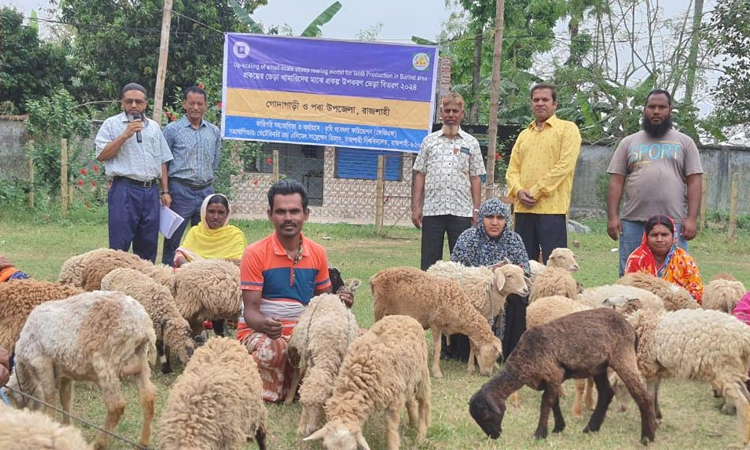News Flash

By Md Aynal Haque
RAJSHAHI, May 12, 2025 (BSS) - Lamb rearing venture has been making significant strides towards infusing dynamism into the rural economy and empowering marginalized communities in the region, including the vast Barind region.
With household-based sheep farming gaining momentum, rural communities are overcoming traditional barriers in livestock management, infrastructure, and awareness. The initiative has brought a wave of change among small farmers, particularly women and landless households.
Sheuly Begum, 45, a resident at Godagari Upazila, has found the path of making herself self-reliant through her household-based sheep farming entrepreneurship. She has now eight healthy sheep since her launching the initiative with five ones on March 24.
"I'm proud to be a part of the income-generating activity. This has been a turning point for my family. I'm very much hopeful of doing better in the years to come," said Begum, while talking to BSS on Sunday.
Moni Begum, 43, another resident at Paba Upazila, engaged herself in the activities in April 2024 with five sheep and now owns nine. Her growing flock is a testament to the success of scientific care and community support.
As part of its "Up-scaling of small-scale sheep rearing model for lamb production in Barind area", Department of Veterinary and Animal Sciences at University of Rajshahi has distributed 200 sheep among 40 marginal farmers, including the two aforesaid ones.
Within a year, 177 lambs were born, registering a flock increase to 88.5 percent bringing the total to 377 sheep.
The beneficiaries were imparted practical training on knowledge in scientific rearing practices, housing design and veterinary care.
Under the project, participation of 87.5 percent of women and 92 percent of landless or near-landless households were ensured making it a model of inclusive rural development.
Principal Investigator of the project Professor Jalal Uddin Sarder said 40 standardized sheep shelters were constructed, improving livestock welfare and minimizing disease risks.
Awareness campaigns, courtyard meetings and school programs were also conducted promoting lamb consumption, animal welfare and the benefits of sustainable sheep farming.
In the district, a sheep development farm at Rajabarihat under Godagari Upazila has been working for ensuring safe, adequate and quality animal protein to all.
The state-owned farm is also mandated to fulfill the demands of animal proteins through value-addition together with providing animal health services and boosting animal production and its productivity.
Mita Mormu, 20, a postgraduate student at Kakonhat Degree College under Godagari upazila in the district, has found the path of generating income through lamb rearing.
She said sheep farming has a vital role towards women empowerment and poverty reduction at the grassroots. Many of her co-villager students have attained success through sheep farming, she added.
Anandi Saren, 19, has become almost self-reliant through her household-based sheep farming besides contributing to her family and the society as a whole.
After getting one sheep as donation on voluntary basis in 2015, she enhanced the number to 11 at present by dint of her much attentiveness and devotion to the sheep rearing venture.
An undergraduate class student of Kakonhat Degree College, she had filled up her form for HSC Examination in 2023 with the money that she earned after selling two sheep.
Anandi Saren, daughter of Mikhail Saren in Sundarpur village of Godagari upazila in the district, has elaborated her success through her efficiency in the micro-level venture, while talking to BSS.
She said the single lamb was her lifeline for taking the poverty-prone family to a stable position. But her initial stage was not happy as many of her neighbors criticized the sheep farming initiative.
Anandi said the sheep farming has eradicated her poverty and enhanced her dignity in the society. She gets money, meat and milk from it regularly.
A class-six student of Nobai Bottola Mission High School in Godagari upazila, Shefali Saren is seen very much devoted to the rearing since she was given two sheep in 2020.
Like them, 145 ethnic minority female students were given 145 sheep in Godagari, Tanore and Chapainawabganj sadar upazilas since 2017 with the main thrust of facilitating them to continue their respective institutional learning through the sheep rearing income.
Dr Hemayetul Islam, General Secretary of Bangladesh Livestock Society, said there is no protein-value difference between the meat of sheep and goat or cattle.
Lamb meat is enriched with more protein in comparison to goat and cattle.
Wide-ranging promotion of commercial sheep farming can contribute to increased woolen fiber production and produce more meat and milk to meet the country's nutritional demand.
He said sheep are more resistant to disease than other domestic animals, adding the household-based sheep farming, after using modern methods and technologies, can be a vital means of meeting up the nutritional demand in the region.